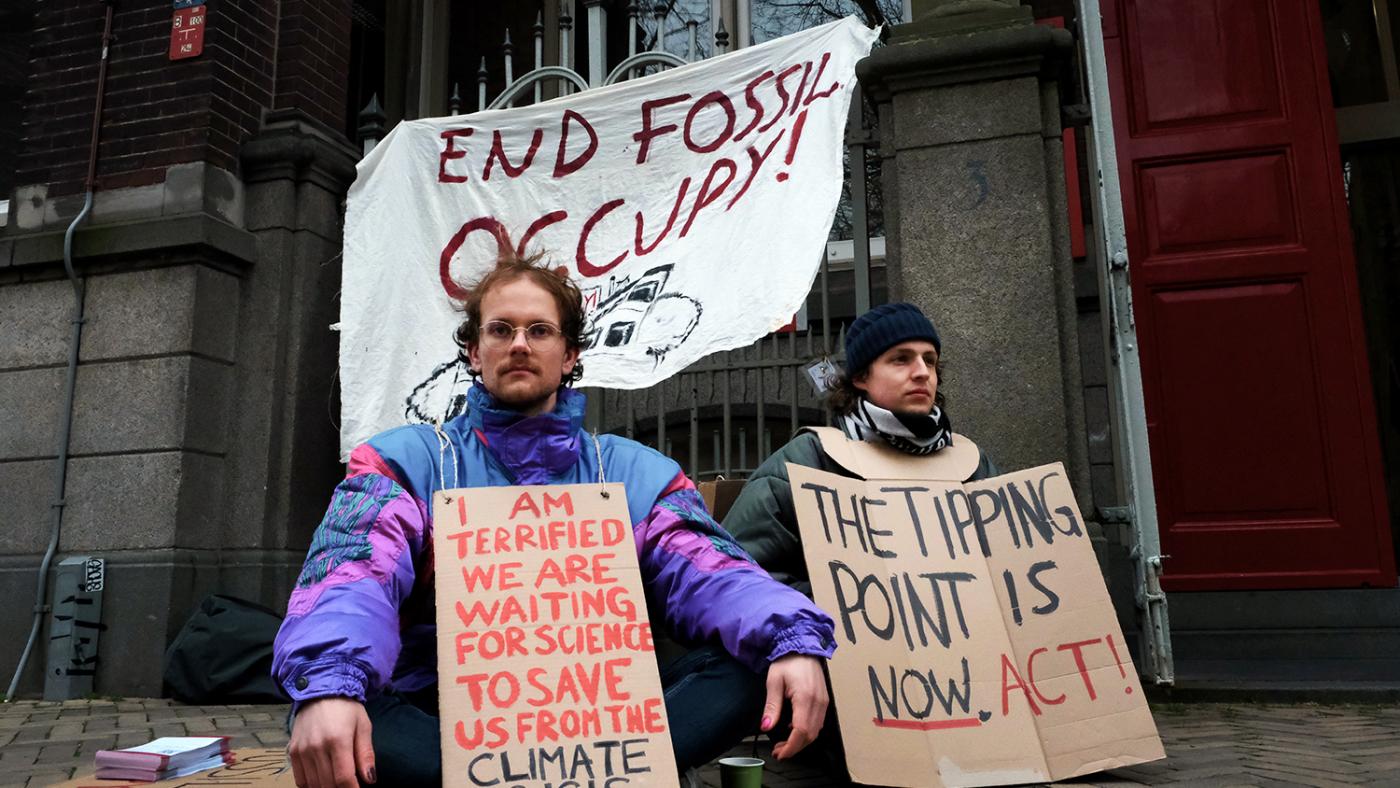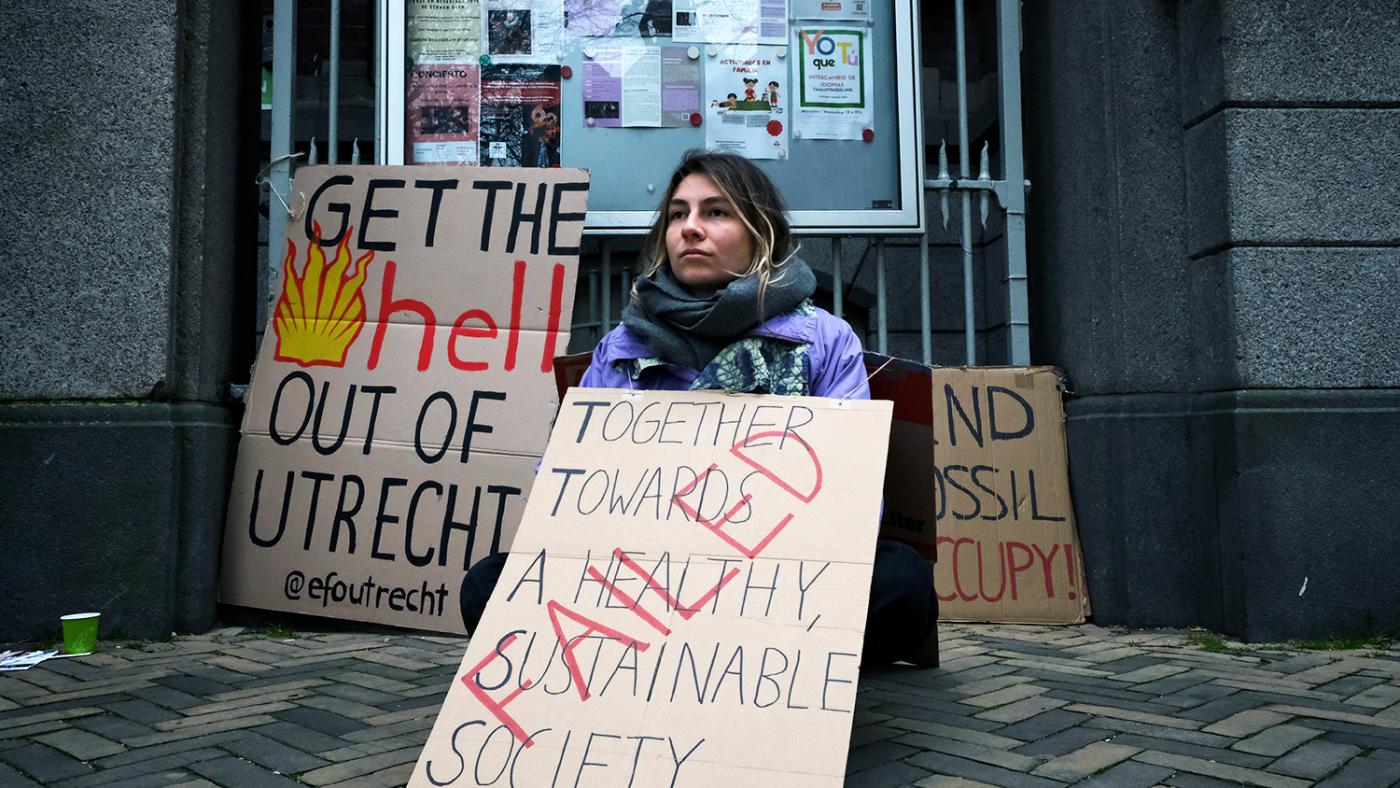Should the university cooperate with the fossil industry?
‘We’re all idealists, otherwise we would be working at Shell’

It’s not an ordinary thing: planning a three-hour debate and having it start on a Monday morning at 9am? Despite this remarkable hour of the day, about ten student activists of End Fossil: Occupy gathered at the entrance of the Cervantes Institute on the Dom Square with banners and protest signs.
Due to lack of space in its own UU buildings, the first of two university meetings on collaboration between university scientists and fossil companies will take place there. Those meetings should help the university board reach a position on the issue.
UU decided to organise the meetings because ever more students and employees are now speaking out against collaborations with the fossil industry. In other cities for example, university buildings were occupied and more and more employees seem to sympathize with these kind of protests.
By that, the role of universities in the energy transition has become magnified. Meanwhile the University of Amsterdam decided to no longer start new research collaborations. In an interview with DUB, rector Kummeling in this turn pointed to the fact that joined research projects can be of great value.
The student activists outside the Spanish cultural centre on the Dom Square like the fact that the subject is now really on the table at UU and therefore they are holding a ‘non-disruptive protest’. They don’t wan to disturb the meeting itself. First-year student Literary Sciences Ianthe Minnaert: “But it can’t stop at talking alone. We want to keep the pressure on.”
Few students
Moments later, inside, some 40 UU-ers are sitting on red fabric chairs in a circle along the sides of a bare theatre hall. There are scientists known for their social commitment as well as those who themselves work with large fossil companies. There are also several administrators, directors and support staff.
Ianthe is in the hall as well, but the number of students can almost be counted on one hand. The students that are present will point out the underrepresentation multiple times during the meeting. They also find the “privileged, highly educated, white group” that is present a poor reflection of society.
Do not interrupt
The meeting proceeds according to the principles of ‘Deep Democracy’. In doing so, those present do their best to treat all attendees equally. So even the UU administrators present, Rector Kummeling and College President Anton Pijpers, cannot invoke their status for three hours.
Furthermore, the agreement is to respect and value all views - including minority views, according to a detailed explanation used by discussion leader Yonathan Keren to introduce the discussion. This should prevent conversations from turning to convincing each other and arguments being merely repeated.
It’s a change from what most of the people present are used to. When Keren asks about the feeling they had when driving to Dom Square this morning, it also leads to some hesitation. But when someone notes that for him, the outcome of the Provincial Elections casts a shadow over all the efforts for climate improvement, it turns out that many recognize this. At that moment, the attendees still don’t know about the alarming IPCC report that would be announced later that day.

Morals versus pragmatics
Keren's set-up seems to work out pretty well throughout the morning. For example, he asks some attendees to stand and state their point of view. The other attendees must indicate the extent to which they agree with that opinion by standing close to the speaker or far away. By changing places, participants can indicate which arguments they like. Speakers may not be interrupted and questions are not allowed.
The arguments put forward for or against collaboration with fossil companies are more moral in nature (‘stopping collaboration has an important signalling function’) or more pragmatic and technical (‘we need the big companies to implement plans to become greener’).
Attendees frequently switch from one side to the other. This reflects the complexity of the topic and the inner struggle that many apparently feel.
Collaboration is inevitable
Chemistry professor Bert Weckhuysen, scientific director of a consortium that focusses on making the chemical industry greener and of which Shell is one of the partners, says that collaboration with big companies is inevitable for those who have the ambition to stop the use of fossil energy. For making real impact there is a need for a certain scale size. Companies that currently extract fossil resources have the potential to make the necessary changes.
In addition, Weckhuysen expresses the hope that by developing new knowledge and by educating climate-conscious students, scientists can change these companies from the inside. “I am aware of the fact that there’s a risk of greenwashing involved, but this is the consideration we must make.”
The professor gets support from several other attendees. They too point to the scale of the reductions needed and the knowledge and infrastructure required to bring about those improvements. "These companies are not just good at pumping oil out of the ground," someone argues.
Almost all people present seem to recognise that collaboration with the fossil companies is morally questionable, but some thus fear the negative consequences for the climate if ties are intensified. Without being clear what those consequences are going to be, this step is considered too risky.
Destroying the world
Student Ianthe Minnaert says they actually find it risky to continue working with these companies. They have little need of a long-term perspective based only on the hope that fossil companies will eventually change. Certainly not if, in doing so, the risks lie with today's students and older generations can put off the consequences.
Emotionally, the student says they have been fighting this for a quarter of their life. "There is something we can do right now, and that is to stop pumping. Why not work with our generation instead of old companies that are destroying the world?"
This also receives acclaim. The idea that the university can still move the fossil industry in the right direction through collaboration is something many attendees find implausible. They distrust the sincerity of their sustainability ambitions, denounce the companies for spreading disinformation and underline human rights violations.
Because of the role of shareholders, quick profits remain the guiding principle. As long as no one can prove that universities' input makes fossil companies more sustainable, are “no more than useful idiots", says associate professor transformative imagination Joost Vervoort
This part of the attendees emphasize that the university is not merely a knowledge institute, but that it also fulfils a social role. By continuing to collaborate, they fear that the university contributes to the legitimisation of the bad behaviour of the companies. They also emphasize that this way, the image of the companies is maintained.
These are partly familiar contrasts, but the sharp edges are missing. Possibly also because Keren explicitly asks those present to reflect on which arguments have impressed them. By word and gesture, Weckhuysen makes it clear that he struggles considerably with the issue - which is appreciated. Throughout the rest of the debate, too, the emotion under the surface is palpable. A few are visibly touched. Several times, those present ask the question of conscience whether they are "doing enough" as individuals, but also as a university world as a whole.
A moral framework
A suggestion that, at least as a university, "a moral framework" be drawn up with some basic principles that partnerships should comply with, ultimately seems to be met with fairly broad support. But this is followed by the question of what exactly it should contain and what the consequences would be. "If I would soon not be able to continue my research that contributes to the necessary transition, that would be hard for me to swallow," a young researcher comments.
College president Anton Pijpers also points out that there could be more far-reaching consequences if UU starts to lay down certain 'values' and live up to them in practice. "We need to change things in our behaviour, but how principled do we want to be in this? So does that mean that as a university, for example, we believe that employees should no longer fly at all? That's something I'm struggling with."
"At least we can see that everyone recognises the urgency," says Keren as he summarises the main findings at the end of the morning. But on solution directions, there is disagreement, he also notices.
When he asks to what extent attendees think the meeting has met expectations and to what extent it can help the UU board reach a position, different opinions are heard.
There is scepticism. Aren't the conclusions "too middle of the road"? According to one attendee, this was mainly an ideological discussion where the arguments were already known to him. A practical vision of the future had received too little attention.
Others expressed themselves positively. Joost Vervoort, associate professor in the Copernicus Institute for Sustainable Development, says he was inspired. "At least we can conclude that we are all idealists, otherwise we would be working at Shell."
The second meeting will take place in May. Before the summer, the UU board plans to come up with a draft decision stating how the university intends to proceed with its collaboration with fossil companies.
A report of the meeting can be found on the UU site. Those wishing to register for the second session (in English) on cooperation with the fossil industry can do so via this link.